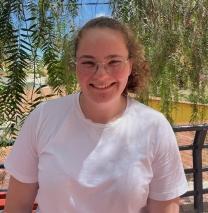Top result in psychotherapy studies
"I hardly eat any more, otherwise I'll feel sick," says the young woman, nervously tugging at her sleeve. Elisa Braunsdorf listens attentively, asks questions and gently explains what anorexia is - a form of eating disorder in which those affected try to regain control over their own body. She describes possible treatment steps, talks about support and therapy. If you didn't know any better, you might think it was a therapy session. But the scene is not set in a doctor's office, but in an exam room at the University of Siegen. Elisa Braunsdorf is the exam participant, the patient is an actress, the situation is part of the state licensing exam for prospective psychotherapists.

25-year-old Elisa Braunsdorf is one of a total of 17 students on the "Clinical Psychology and Psychotherapy" Master's degree course at the University of Siegen's Schools II who passed the state licensing exam in the fall. Success rate in the first year in Siegen: 100 percent. They can all officially call themselves psychotherapists. In North Rhine-Westphalia, 114 people sat the exam. Nationwide, the failure rate in the previous round was just under ten percent. "The fact that all of our students passed on their first attempt makes us very proud," says Professor Dr. Tim Klucken. "We feel that this confirms that our degree course prepares students optimally for their professional life." Klucken heads the Chair of Clinical Psychology and Psychotherapy and is the spokesperson for the Department of Psychology at the University of Siegen.
Empathy meets specialist knowledge
The licensing examination follows the official degree and consists of two parts: an application-oriented course examination with drama patients and an oral-practical case examination. For example, diagnostics, therapeutic relationship management and patient safety are assessed. In some cases, external examiners assess the students. The examination is organized centrally and the requirements are comparable at all universities.
Elisa Braunsdorf reports on two cases from her course examination - an anorexia patient and a patient with agoraphobia, i.e. a fear of public places. The acting patients stay completely in character for 30 minutes, while the examinees simulate a therapy session - all as realistically as possible. "The situation in the exam didn't feel acted at all. I forgot everything around me - both the examiners and the time, which was limited," reports Braunsdorf. "Our task was to explain what is behind the symptoms and how therapy can help. It's important not just to recite knowledge, but to be empathetic and convey psychological knowledge in an understandable way."
Half of the course consists of practical training
This combination of theory and practice is practiced intensively during the course. "For example, we learned how to write reports and guide patients," says Braunsdorf. The students completed a year of internships - Elisa Braunsdorf in the university outpatient clinic at the University of Siegen and in a day clinic. She studied and prepared four patient stories in particular detail. This is because a large part of the licensing examination consists of selecting and discussing one of these stories in the practical oral examination. Here, Elisa Braunsdorf has to go into detail and answer critical questions: Why did she make this diagnosis and not another? Which symptoms are typical for the clinical picture? What role does the patient's biography play? This part of the exam also covers methods and specialist knowledge from the entire Master's degree course, for example on confidentiality and psychotherapeutic guidelines.
For Elisa Braunsdorf, successfully passing the exam was a decisive moment: "The licensing exam is the only way to achieve my professional goal as a psychotherapist. I was incredibly nervous beforehand - in hindsight, I know that we were so well prepared that I should have been less stressed. When I found out that I had passed, I was just relieved and happy." Her next step will take her to a day clinic in Sauerland. She will probably work there as a psychotherapist in further training - the prescribed route to specializing in a specific therapeutic method and gaining approval for a practice. She is keeping her mind open as to whether she will return to university later to do a doctorate. "I can well imagine that, but for now I'm looking forward to working with my future patients."
The Master's degree course in Clinical Psychology and Psychotherapy is one of the most popular at the University of Siegen: In the current year, over 1,000 people applied for the original 45 places. The number of places was increased to around 70.

